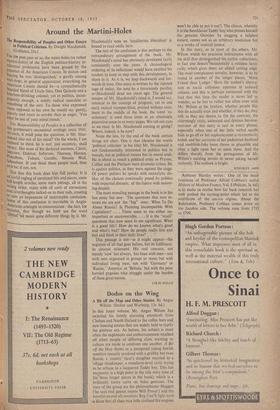Around the Martini-Holes
The Responsibility of Peoples and Other Essays in Political Criticism. By Dwight Macdonald. (G ollancz, 21s.)
Fmk tffe past year or so, the water-holes (or rather iartini-holes) of the English politico-literary in- tellectual proletariat have . been graced by the Presence of An American Cousin. In stature and baring he was 'distinguished,' a giraffe among wart-hogs; in general appearance, everything An American Cousin should be—a sympathetically bearded blend of Uncle Sam, Don Quixote and a bourbon-drinking colonel; yet in politics, incon- gruously enough, a mildly radical anarchist or s )1nething of the sort. To those who expressed views opposed to his own,he would say gently, Vavely and more in sorrow than in anger, 'You must be out of your mind/minds.'
The Responsibility of Peoples is a collection of I 'is gentleman's occasional writings since 1941. As such, it mu s't pose the question, is Mr. Mac- donald also out of his mind? On the whole. I am inclined to think he is not; just eccentric, shall We say, like most of his declared mentors, Christ, Socrates, Diderot, Jefferson, Thoreau, Herzen, Proudhon, Tolstoi, Gandhi, Simone Weil, Schweitzer . If you think these people mad, then so is he; if not, not.
Not that this book does him full justice. It is an awful ragbag of unrelated bits and pieces, some full-length articles, some mere jottings, all in the wrong order, many with all sorts of corrections a id afterthoughts tacked on to their tails, creating in sum an impression of inextricable confusion. Some of this confusion is inevitable in Anglo- American attempts to communicate : the fact, for instance, that though we both use the word 'beral' we mean quite different things by it. Mr.
Macdonald's note on 'totalitarian liberalism' is bound to read oddly here.
The rest of the confusion is due perhaps to the extraordinary arrangement of the book. Mr. Macdonald's mind has obviously developed fairly consistently over the years. A chronological ordering of its reflections would have enabled his readers to keep in step with this development, to share in it. As it is, we leap backwards and for- wards in time. One essay is written by the ripened sage of today, the next by a ferociously pacifist, ur-Macdonald dead ten years ago. The general temper of Mr. Macdonald's mind is, I would say, inimical to the concept of progress; yet in one early radical trumpet-blast, printed without com- ment in the middle of the book, the word 're- actionary' is used three times in an absolutely pejorative sense in as many pages. We rub our eyes as we read. Is Mr. Macdonald coming or going? Where, indeed, is he now?
None the less, by the end of the book certain things are clear. One is that (despite the words 'political criticism' in his title) Mr. Macdonald is not fundamentally interested in politics but in morals, not in political means but in moral ends. He is about as much a political critic as Prynne, Collier and the Puritans were dramatic critics. He is against politics, as they were against the stage. Of power politics he speaks with unanalytic dis- like; of the choices continually posed by politics with impartial distaste; of the future with mount- ing despair.
The most revealing passage in the book is in the last essay but one: The questions that now in- terest me are not the "big" ones: What To Do About Russia? Is Planning Incompatible With Capitalism? . . . These seem to me either un- important or unanswerable. . . . It is the "small" questions that now seem to me significant. What is a good life? How do we known what's good and what's bad? How do people really-live and feel and think in their daily lives? . .
This passage is not—as it might appear—the negation of all that goes before, but its fulfilment, its clearest statement. His real concern, not merely 'now' but always, has been with men—not with men organised in groups or states but with individual living men; not with 'Germany' or 'Russia,' America' or 'Britain,' but with the poor harried pygmies who struggle under the burden of these great names.
COLIN WI.I ( II


































 Previous page
Previous page